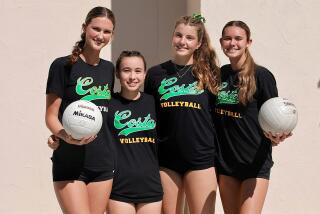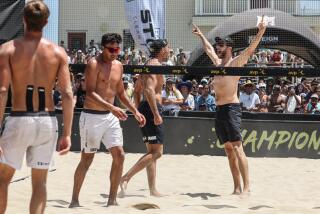Every Dog Has His Day On the Court : Volleyball: Whitmarsh turns rejection by NBA Timberwolves into a fine new career in professional beach volleyball.
- Share via
SAN DIEGO — This was a four-month pity party minus the pity.
In the fall of 1989, Mike Whitmarsh was cut from the Minnesota Timberwolves, then an NBA expansion team. Rather than face sympathetic friends here, he headed to Australia to brighten his darkest hour, said his mother, Sharon Hill.
In what Whitmarsh described as “one of the greatest summers of my life,” he and buddy Rande Turner hopped from Bali to New Zealand to Fiji, but stayed in Australia long enough to play on the pro beach volleyball tour, where Whitmarsh made volleyball his next passionate pursuit.
That move is paying off handsomely. In his third year on the Assn. of Volleyball Professionals tour, Whitmarsh, 30, now is the seventh-leading money winner and ranks sixth in the AVP’s bonus points standings. Going into this weekend’s San Diego Open at Mariners’ Point, Whitmarsh and Brent Frohoff, both of Manhattan Beach, are the fifth-ranked team.
How Whitmarsh, a Monte Vista and USD graduate, turned a sometimes disappointing pro basketball career into a respectable one as a pro beach volleyball player is confounding.
When you haven’t touched a volleyball until you’re in your 20s, you’re not supposed to challenge the world’s top players. Whitmarsh never read the rules, he’s just making them up as he goes.
“When I first started playing, during the summers at South Mission when I was home from playing basketball in Europe, I would have trouble getting games,” Whitmarsh said. “If Rande wasn’t around, no one wanted to play with me. I was pretty horrible back then.”
Which meant back to the mid-1980s, when most players his age already had a good 10-15 years of experience.
“This is twice as much fun as basketball. I only wish I had started 10 years ago. I can’t imagine a better way to make a living,” he said.
Frohoff, who Whitmarsh won his first AVP title with in New Orleans three weeks ago--after placing 17th the week before--can’t imagine his partner’s skill level with a decade more experience.
“He’d be No. 1, no doubt,” Frohoff said. “He’d be the man. He’s only 30, and that’s not too old by any means in this game . . . But he could have been phenomenal .”
Turn back time and Whitmarsh probably would be digging balls out of the sand more often than he’d be driving to the basket, which his mother finds ironic.
“When the boys were growing up, we used to go to La Jolla Shores a lot, and they would always go surfing with their father,” she said. “I didn’t surf, so I’d go watch the volleyball games. Mike and his brothers had absolutely no interest in it.”
After he graduated from Monte Vista, Whitmarsh spent two years at Grossmont College to raise his grades so he could accept a USD scholarship.
In two seasons at USD, the 6-foot-7 forward set Division I single-game scoring records--37 points against Loyola Marymount and 32 against Nevada--marks that remain the Toreros’ top two. In 52 games, he averaged 17.2 points per game, good for third on the career list.
La Jolla’s Eric Musselman played with Whitmarsh in 1983-84, the first season a Division I USD team made the NCAA tournament. That year, Whitmarsh was named Co-Player of the Year with Gonzaga’s John Stockton, a guard for the Utah Jazz and a member of the U.S. Olympic team.
“He was the reason we got that far,” said Musselman, now the coach of the CBA’s Rapid City Thrillers. “Whenever we needed a basket, we got the ball in his hands. All the plays went through him. If he didn’t get the big shot, he’d make the big pass. He was so multidimensional.”
Whitmarsh was drafted in 1985 by Portland, where he played exhibition games but didn’t make the final cut.
“They decided to take a guy named Jerome Kersey over me,” he said with a laugh. “Can you believe that? I bet they’re regretting that now.”
He played three seasons of pro ball in Berlin before he was offered a tryout with the Timberwolves.
“The biggest highlight,” he said, “was in a preseason game. Minnesota was playing the Lakers and the next day, there was a picture in USA Today of Magic Johnson guarding me. That was a special moment of my career.”
Soon after that, Minnesota released him. Musselman, whose father was coach of the Timberwolves then, said the cut wasn’t all it appeared to be.
“People think an expansion team is the easiest to make, but sometimes it’s the hardest,” he said. “They’re looking at you as the foundation of the team, not just a role player like the 11th or 12th man on a normal team. Everything you do is heavily scrutinized, criticized. You make one little mistake and that’s it.”
Said Whitmarsh: “It was kind of painful being so close and then not making, but then I thought, to heck with it.”
It was off to Australia, where he and Turner combed the country while they depleted their life savings, estimated at a combined $32,000.
Whitmarsh eventually headed back to San Diego, but only for a week. On the eve of the 1990 AVP tour opener, Whitmarsh heard from a player who needed a partner.
To say his family, his most loyal and ardent supporter, was skeptical of the plan is being generous.
“Our first reaction was, ‘What do you mean you’re going to play volleyball? You don’t know how to play.’ It’s mind boggling that he’s done so well,” Hill said.
Whitmarsh rustled up money for air fare and went to Florida, where things went probably too well for his own good. There, he and his partner had Karch Kiraly and Kent Steffes, now the top-ranked team on tour, on the ropes before their 14-9 lead dissolved into a 21-19 loss in a two-hour game.
“I remember thinking, ‘Heck, this volleyball stuff won’t be so hard,’ ” said Whitmarsh, who finished ninth and followed it up with five 17th-place finishes in a row.
If not victories, Whitmarsh did grab attention.
“People had no idea who I was. Everyone was coming up to me wanting to know where I came from,” he said.
Frohoff was among the curious: “I have to admit, I was thinking the same thing. ‘Who is this guy, can he really play?’ All that stuff that goes through your mind.”
To this day, Whitmarsh remains somewhat of an enigma on the tour.
“It’s intriguing to all the players that he’s from another pro sport, even though he doesn’t like to talk about it much,” Frohoff said.
Whitmarsh became Rookie of the Year, earned $20,000 and contemplated a return to basketball.
“That first year was trying,” Whitmarsh said. “I wanted to lace up my sneakers again. But when I went home, my dad pulled me aside and told me the only way I’d make it was to move to L.A.”
He immediately moved to Manhattan Beach and rented an apartment from fellow tour member Tim Hovland so he could practice with the best.
Last year his income swelled to six figures, including sponsorship money.
“I got in at the right time,” he said. “Five years ago, you couldn’t make that kind of money out here.”
Five years is about how much beach volleyball Whitmarsh feels he has left in him. During that time, he is intent on refining his raw talent.
For being the tallest player on the tour, Frohoff said Whitmarsh doesn’t block as well as he should, and he needs to cut down on mistakes.
“Man, if I was that tall,” he said. “I tell him to watch the guys like (Randy) Stoklos and Pat Powers. They put their arms up there for a reason. That’s one big thing he lacks, but everything else is pretty good.”
As serious as Whitmarsh is about the game, and his accelerated improvement in it, he can still poke fun at aspects of it. Volleyball, he said, is hardly a tennis or golf game, but the etiquette surrounding it can be.
“I don’t know how these guys would survive in basketball, with a second left on the clock, you’re on the free throw line, the game’s tied, and thousands of people are jeering at you,” he said. “They like to have it quiet before they serve. I’d like to see more yelling, a little rowdiness.”
Then he could put some sass in, say, the senior golf tour, which Hill is sure her son can play when volleyball is no longer lucrative.
More to Read
Go beyond the scoreboard
Get the latest on L.A.'s teams in the daily Sports Report newsletter.
You may occasionally receive promotional content from the Los Angeles Times.










